|
|
|
Sort Order |
|
|
|
Items / Page
|
|
|
|
|
|
|
| Srl | Item |
| 1 |
ID:
108495
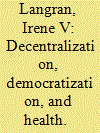

|
|
|
|
|
| Publication |
2011.
|
| Summary/Abstract |
In 1991, the Philippines joined a growing list of countries that reformed health planning through decentralization. Reformers viewed decentralization as a tool that would solve multiple problems, leading to more meaningful democracy and more effective health planning. Today, nearly two decades after the passage of decentralization legislation, questions about the effectiveness of the reforms persist. Inadequate financing, inequity, and a lack of meaningful participation remain challenges, in many ways mirroring broader weaknesses of Philippine democracy. These concerns pose questions regarding the nature of contemporary decentralization, democratization, and health planning and whether these three strategies are indeed mutually enforcing.
|
|
|
|
|
|
|
|
|
|
|
|
|
|
|
|
| 2 |
ID:
106964
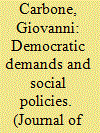

|
|
|
|
|
| Publication |
2011.
|
| Summary/Abstract |
It is commonly assumed that the advent of democracy tends to bring about social welfare improvements. Few studies, however, have examined empirically the impact of third-wave democratisation processes on social policies in developing countries, particularly in sub-Saharan Africa. Through a diachronic comparison, this paper examines the effects of Ghana's democratisation process on the evolution of its health policy. It shows that the emergence of democratic competition played an important role in the recent adoption of a crucial health reform. A policy feedback effect on politics and a process of international policy diffusion were additional but secondary factors.
|
|
|
|
|
|
|
|
|
|
|
|
|
|
|
|
| 3 |
ID:
155174
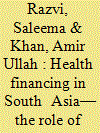

|
|
|
|
|
| Summary/Abstract |
Millions of households are pushed into poverty every year because of high outof-pocket
(OOP) expenditure on health care. Globally, each year more than 150
million people face financial catastrophe and around 100 million suffer destitution
due to OOP payments made for health care. More than 90 per cent of these people
reside in low-income countries. In South Asia, impoverishment due to health
payments is significant with at least 32 million people in India alone being pushed
into poverty annually due to OOP expenditures on health care. In most health care
systems in this region, the role of public spending on health and prepaid schemes,
such as tax and social insurance, is limited as is the extent of financial risk protection.
The problem is compounded by the large informal sector which is a major
challenge to attaining universal health coverage in South Asian countries.
Recent literature points to the role of public–private partnerships (PPP) in
health care as a viable solution for ensuring equitable access to health care especially
for the poor. This article seeks to review the major components of health
care financing and reform including financial risk protection, resource generation
and pooling, and PPPs in procurement and payment in South Asia. It identifies
key lessons across the health financing systems of Asian countries that
have attempted to reduce dependence on OOP expenditures, expanded health
service delivery and increased pooled health financing mechanisms. It analyses
the role and importance of PPPs in mitigating the impoverishing effects of OOP
health expenditure in South Asia.
|
|
|
|
|
|
|
|
|
|
|
|
|
|
|
|
| 4 |
ID:
095190
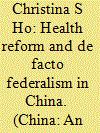

|
|
|
|
|
| Publication |
2010.
|
| Summary/Abstract |
Understanding China as a de facto federalism can generate explanations and recommendations concerning the path of China's health reform. The first section reviews how de facto federalism drove the historical development of the problems plaguing China's health system. The next section shows how certain features of the current reform plan, namely, the plan's ambivalence between government and market approaches and its lack of strong centralisation, can be explained by de facto federalism. The third section uses the hypothesis of de facto federalism to generate two courses of action - one cautionary; the other, aspirational - that could be considered for the future. The consequences for the health sector of under-articulated federalism are clarified and point to the need for discursive reasoned elaboration, as opposed to political bargaining alone, in federalism.
|
|
|
|
|
|
|
|
|
|
|
|
|
|
|
|
| 5 |
ID:
137425
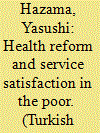

|
|
|
|
|
| Summary/Abstract |
Turkey began to reform its healthcare system in 2003 and introduced universal health insurance in 2008. This paper tests the effect of health reform in Turkey on satisfaction in the poor with public health services. An ordered logit model is applied to a pooled data set compiled from the Life Satisfaction Survey (N = 60,281) by the Turkish Statistical Institute during the period from 2003 to 2011. The results reveal that at the outset, the lowest 30 percent income group was less satisfied than the highest 70 percent income group, but this satisfaction gap dissipated after 2004 and never reappeared even during the post-reform period (2009–11).
|
|
|
|
|
|
|
|
|
|
|
|
|
|
|
|
| 6 |
ID:
160415
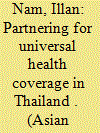

|
|
|
|
|
| Summary/Abstract |
The Thai National Health Security Act of 2002 established a universal health coverage program that extended health care to 18 million previously uninsured Thais and significantly reduced rates of medical impoverishment. This article highlights the key role that a coalition of health bureaucrats and NGOs played in achieving this outcome.
|
|
|
|
|
|
|
|
|
|
|
|
|
|
|
|
| 7 |
ID:
099318
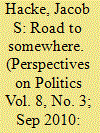

|
|
|
|
|
| Publication |
2010.
|
| Summary/Abstract |
Why did comprehensive health care reform pass in 2010? Why did it take the form it did-a form that, while undeniably ambitious, was also more limited than many advocates wanted, than health policy precedents set abroad, and than the scale of the problems it tackled? And why was this legislation, despite its limits, the subject of such vigorous and sometimes vicious attacks? These are the questions I tackle in this essay, drawing not just on recent scholarship on American politics but also on the somewhat-improbable experience that I had as an active participant in this fierce and polarized debate. My conclusions have implications not only for how political scientists should understand what happened in 2009-10, but also for how they should understand American politics. In particular, the central puzzles raised by the health reform debate suggest why students of American politics should give public policy-what government does to shape people's lives-a more central place within their investigations. Political scientists often characterize politics as a game among undifferentiated competitors, played out largely through campaigns and elections, with policy treated mostly as an afterthought-at best, as a means of testing theories of electoral influence and legislative politics. The health care debate makes transparent the weaknesses of this approach. On a range of key matters at the core of the discipline-the role and influence of interest groups; the nature of partisan policy competition; the sources of elite polarization; the relationship between voters, activists, and elected officials; and more-the substance of public policy makes a big difference. Focusing on what government actually does has normative benefits, serving as a useful corrective to the tendency of political science to veer into discussions of matters deemed trivial by most of the world outside the academy. But more important, it has major analytical payoffs-and not merely for our understanding of the great health care debate of 2009-10.
|
|
|
|
|
|
|
|
|
|
|
|
|
|
|
|
|
|
|
|
|